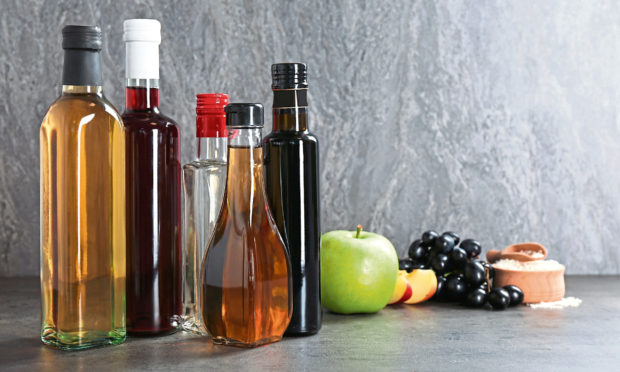A few weeks back, Amber Lights looked at the many different alcohols there are, apart from the one we drink.
Today, we shall look at one of alcohol’s closest chemical relatives – one we also drink, although in limited quantities. That is vinegar, or rather acetic or ethanoic acid.
Essentially, acetic acid is ethyl alcohol (C2H5OH) that has lost two hydrogen atoms but gained an oxygen atom (CH3COOH) – and, boy, does that hydrogen-oxygen swap make a difference. Mixed with plenty of water, it is vinegar, which is usually 4% to 8% acetic acid.
When people first brewed alcohol such as wine or beer centuries ago, they soon learned that they either had to drink the stuff quickly, or else seal it in airtight containers, otherwise the alcohol quickly fermented further to acetic acid, which made it pretty unpalatable.
This was a particular problem with wine, as the grapes’ own yeasty enzyme all-too-quickly caused the wine to ferment further and go sour. It is no coincidence that the word vinegar comes from the French vinaigre, or “sour wine”.
That said, vinegar has proved in many ways to be as usable and useful a liquid as alcohol. It is an essential ingredient in many foods, universally used for preserving and pickling everything from olives to onions to sauerkraut, and for centuries was used for household cleaning and for polishing metals. Even today, some cleaning liquids contain vinegar, although, owing to its strong and lingering smell, other chemicals have tended to supplant it in modern cleaning fluids.
Years ago, vinegar in the UK was the brown or colourless stuff squirted on to fish and chips. Today, the vinegar shelf in the average supermarket displays an astonishing array – red and white wine vinegars, cider vinegar, sherry vinegar, malt and distilled vinegars and, more recently, sweet-sour balsamic vinegars from Italy.
However, it is interesting to think that centuries ago, vinegar was probably discovered in error by brewers or winemakers who left their beer or wine standing too long and found it had “gone off”. Rather than pour it away, they sought a use for it and discovered it had many.
So never snigger at vinegar – alcohol’s cousin can stand proudly beside it.

